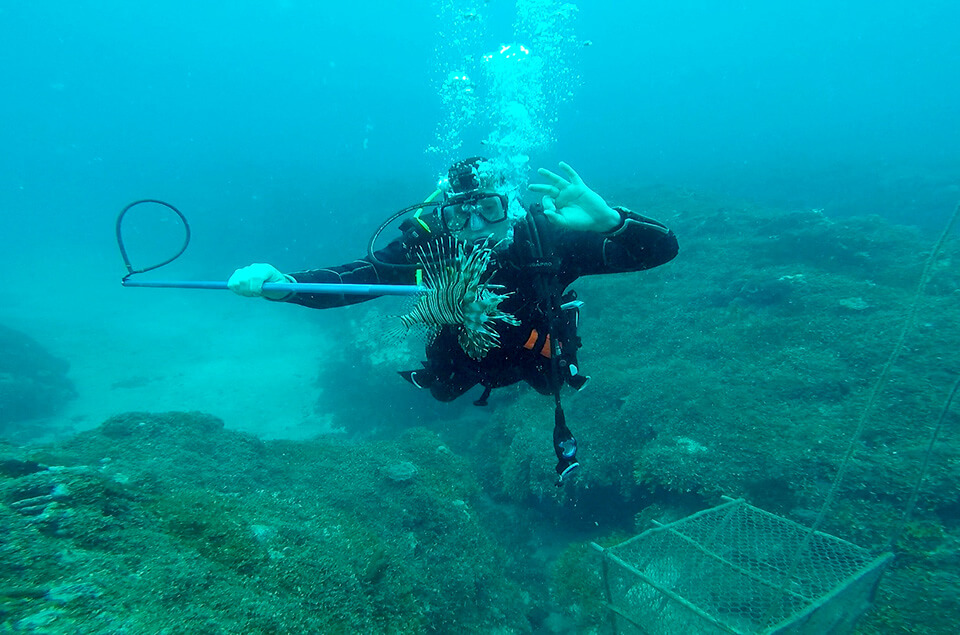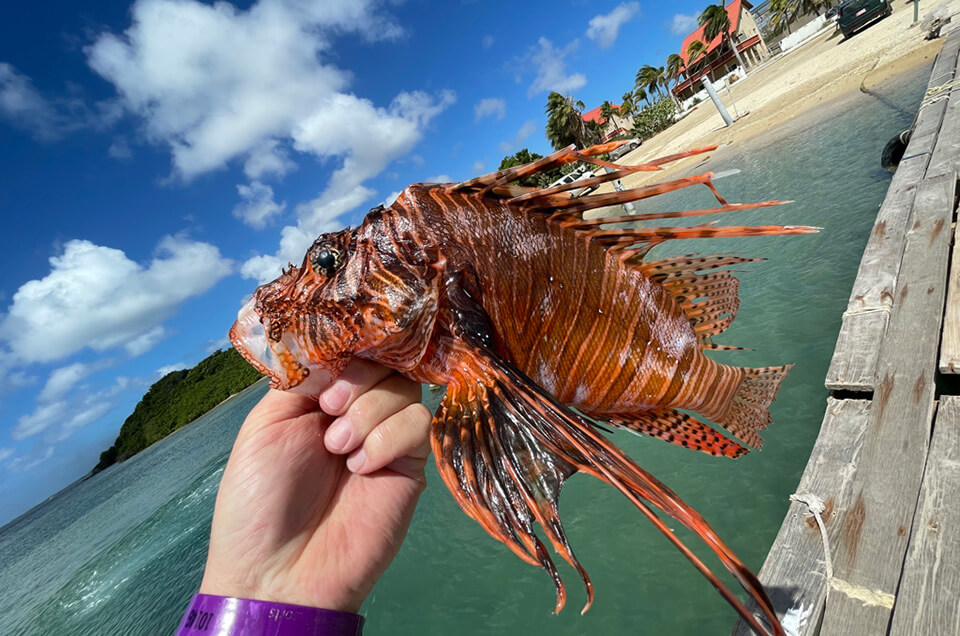Who Eats Lionfish? Learning About Lionfish Predators

Researchers have not always paid much attention to lionfish predators. However, that is changing because of the harmful effects this invasive species has on Atlantic and Caribbean fisheries and coral reefs. At Lionfishdivers.com, we encourage people to take up the sport of hunting lionfish to help control the lionfish population. In addition to providing recreational spearfishing, lionfish are delicious, which is a bonus for scuba divers, restauranteurs, and diners.
Since fish are an important component of healthy diets around the globe, humans may become the greatest lionfish predators. Here, we discuss the different predators of lionfish and how humans can control this invasive species.
Predators of Lionfish
Until recently, lionfish have not been the focus of much research, so information about lionfish predators is scarce. With that being said, there are some known facts about lionfish. Lionfish are found in the waters surrounding Australia. Their native range is in the Indian Ocean, the South Pacific, and the Red Sea. They are thought to naturally exist in warm, shallow marine waters, but have been found in depths from one to 1000 feet.
Lionfish are classified as part of the Scorpaenidae family. Other species of these scorpion fish are thought to prey on their lionfish relatives. In their natural habitat, large-sized saltwater eels, such as Moray eels, can be one of many lionfish predators. Although, these shy, prehistoric creatures are known to elude human observation. Other fish species thought to eat lionfish in their native habitat include:
- Cornetfish
- Grouper
- Snappers
- Frogfish
As lionfish populate areas along the Atlantic Coast and in the Caribbean, there are fewer lionfish predators. This is part of the reason that lionfish are damaging our underwater environment. Their reproductive rate is also truly alarming, which adds to their effect.
After mating with several males, the female lionfish can release balls containing thousands of eggs, with as much as 15,000 fertilized eggs released after one breeding period. In addition, lionfish reproduce year-round, potentially outnumbering other reef fish that usually spawn once a year.
Humans as Lionfish Predators
Increasingly, humans are becoming lionfish predators. And we may be the only significant predators in their invasive ranges. As a beautiful, colorful fish with fringes of multiple venomous spines, they have been popular aquarium fish and a delight to snorkelers and divers in coral reef areas. But as the extent of the damage becomes apparent, humans are beginning to understand the voracious feeding habits of these beauties. Lionfish will consume shrimp, lobster, small tropical fish, and any fish they can fit in their mouths.
Culinary motivations are also encouraging humans in their role as lionfish predators. As more chefs and home cooks cook and eat lionfish, their use as an ingredient is becoming more popular. Diners who pay attention to news reports of declines in the world’s fisheries are welcoming the addition of this plentiful source of fish.
Lionfish are also tasty and versatile. They can be easily substituted in a wide variety of fish recipes and preparations. This means consumers can help reduce the impact of this invasive species while enjoying a healthy source of protein.
Can Sharks Eat Lionfish?
Sharks are another large predator that can consume lionfish in their native habitat. And it is hoped that sharks will feed on lionfish in the invasive range, as well. However, evidence of this feeding has been difficult to corroborate. This is partly because some humans are trying to teach sharks to hunt lionfish, which can play a role in decreasing the lionfish population.
Lionfish are adorned with warning colors and venomous spines that dissuade many predators. Scuba divers and researchers have experimented with feeding sharks spearfished lionfish, hoping to encourage the sharks to hunt lionfish on their own.
At this point, it is unknown whether the practice is affecting the lionfish population or shark adaptation. Large natural predators, such as sharks, grouper, and snappers, are thought to consume the lionfish face-first. This is so the venomous spines fold down, harmlessly passing through the mouth and into the digestive tract.
Can Human Predators Help Control Lionfish Populations?
Lionfishdivers.com believes that humans can help control lionfish populations by traveling around the world to hunt and eat lionfish. Travelers can enjoy scuba diving in Aruba, the Grand Cayman Islands, and other Caribbean locations for hunting, cooking, and eating lionfish. Residents of the U.S. can also find warmer opportunities for lionfish hunting in Florida.
The sport of spearfishing lionfish, done with proper equipment, can be great fun for divers. In addition to hunting for dinner, they can help improve the underwater environment. Controlling lionfish populations aids biodiversity, allowing other fish, shellfish, and marine plants to flourish. Lionfish predators can also help struggling coral reef areas by reducing these hungry invaders.
The venomous spines of the lionfish are one concern to note before embarking on your journey. That’s why proper training and equipment are necessary before divers new to the sport attempt lionfish hunting. Keep away from the spiny lionfish, utilize puncture-proof bags, and equip yourself with adequate spears to help avoid lionfish stings. With instruction and experience, scuba divers can soon provide delicious fish while helping to improve these marine environments.
Lionfish Devastation
It may be hard to understand the devastation caused by this one invasive species. Lionfishdivers.com is dedicated to educating the general public about all aspects of lionfish. You can learn more about their environmental impact in our videos, produced in both English and Spanish. We have also created Lionfish Educational Flip Books, Vol. 1 and Vol. 2.
How You Can Help Control Invasive Lionfish
As lionfish predators, humans are one of the best hopes for re-balancing our beloved ocean habitats. Through the education of diver groups and the general public, we can get the word out about how important it is to approve expanded lionfish hunting regulations. Discover how much fun this sport can be by planning your next diving trip around lionfish hunting activities. By serving lionfish at your table and promoting its culinary attributes, you can help generate consumer demand for lionfish.
Join these lionfish organizations, as well as Lionfishdivers.com, in continuing to learn about how to address the problem of invasive lionfish. For more information, contact Roger J. Muller, Jr. at Lionfishdivers.com.





